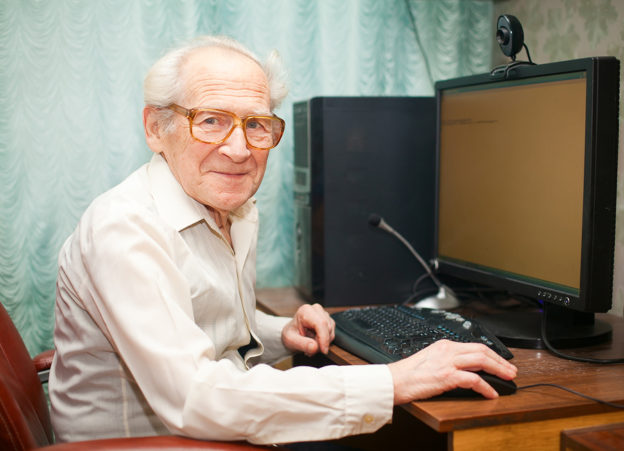By David Blyweiss, M.D., Advanced Natural Wellness
February 3, 2020
I recently had someone ask me what I planned to do when I retired… I think my answer surprised her.
You see, even though I’m past the traditional age of retirement, I don’t see myself ever stopping my work.
I just enjoy talking with people about functional medicine too much. I enjoy seeing patients. And I enjoy training and educating – especially when it’s at an international conference.
I don’t plan on retiring, because if I retire, I’m putting myself at risk of an earlier death.
Now, here in the U.S., 65 is the age we traditionally associate with retirement. Some people look forward to it. After all, that’s when you’ll finally have time to fix up the house and take regular vacations.
Maybe you plan to move to the mountains for some peace and quiet. Or perhaps your goal is to retire near the ocean, where you can take up golf and sailing.
Others hate the idea of leaving their jobs. They enjoy working and like the idea of staying active and involved. They aren’t going to give up their job until somebody forces them out of it.
MD Exposes the Hidden Danger to Your Eyes

When your eyesight starts to fail, it's a real problem. Suddenly you can't go to the grocery store... you can't get to the doctor if you have an emergency... you can't meet your friends for dinner…
Your "regular" doctor doesn't have time to keep up with the latest research. And the same goes for eye doctors. They go to school to learn how to fit you for glasses and contacts, but have no way of preventing the damage and loss of eyesight that threatens your freedom and independence.
Let me show you something that explains a LOT about how your eyes work.
In my FREE Special Report, I'll show you a HUGE, untapped resource for your eyes that safely and naturally restores clear, effortless eyesight.
Click here to get started...
If you – like me – fall into this second category, good for you!
Working longer, staying active and retaining a sense of purpose in life are all linked with a better chance of living a longer life – without heart disease, cancer, dementia and other diseases that kill about 75% of Americans over the age of 65.
In fact, in countries where people live the longest – and in the best health – there isn’t even a word for retirement!
Retire Later, Live Longer
When you hear about regions in the world where large numbers of people live well into their 100’s, it’s easy to think there’s something magical about their location.
These are called “Blue Zones”. And the only thing magical about them is the healthy and active lives the people in these areas enjoy.
These folks have a strong sense of purpose. They’re involved in their communities and maintain a large circle of friends and family. Their favored form of transportation is their feet… they walk everywhere.
Diet is also an important part of their lifestyle. Most of their calories come from a wide variety of plant sources. Meat only accounts for a small portion of their meals.
Now, here’s the thing…
In these regions, people don’t retire when they hit 65, 70 or even 100. No matter what their age, they continue working when and where they are needed. They just do it at a slower pace.
Of course, they aren’t entrenched in corporate careers the way we are here in America. Still, there’s a big lesson we can learn from them.
The World's Quickest Solution for Ending Prostate and Urinary Misery
This has recently been revealed to be one of the only real breakthroughs in prostate health.
The seeds of a strange fruit (sometimes called "Chinese Apples") hold powerful phytonutrients that are a revolution in prostate health.
In fact, UCLA and Veterans Administration research have now proved this to be true.
Not only that, but it may be the worlds quickest solution for ending prostate misery.
Simply stated, these phytonutrients represent a huge step beyond beta sitosterol, saw palmetto, and other phytosterols alone.
Simply click HERE if you want to have fast prostate relief...restful, uninterrupted sleep...no more constant "urges to go"...enhanced virility...and optimal prostate support for life.
The same thing goes for my own form of “retirement.” Sure, I’ve slowed down a bit with my work, but I’m still actively looking for new opportunities and teaching every chance I get.
How to Get the Most Out of Your Retirement
When my patients talk about retiring, I always suggest that they map out an action plan ahead of time. Otherwise, they could end up sitting around the house all day trying to figure out what to do with all of that extra time they have on their hands.
And while they’re sitting around, their brains – as well as the rest of their bodies – are beginning to operate at lower and lower levels. Honestly, it’s never been truer… if you don’t use it, you’ll lose it!
Sit around for too long and the next thing you know you’ll be old, sick and unable to get yourself up out of the recliner.
This is where we can pick up a few tips from the Blue Zones.
Remember, these folks have a sense of purpose. They’re involved in their communities. They stay active and continue working as long as they can.
Now, maybe you don’t want to keep working. That’s okay. It’s still important to stay active and engaged. And there are a lot of ways to do this.
Many of my patients plan to use their retirements as a chance to finally travel the world. Others like to start taking classes. I even know of one lawyer approaching the age of retirement. He plans to take college courses and travel all at the same time!
Here are some more ways to make sure your mind and body stay sharp in retirement.
- Plan your days. Remember, an action plan is always the best plan. If you wake up and don’t know what you’re going to do with your day, you probably won’t do anything. However, if you make a schedule, you’re more likely to stick to it.
- Set aside an hour each morning to take a walk. Vary your route every day to stimulate your mind… and talk to everyone you meet. Then, do it again in the evening.
- Schedule dates for lunch, dinner, movies, museum visits and local events with your friends and family. Join a local sports team… even if to just cheer them on. Get involved in a theater group. Sign up for dance lessons. Do whatever it is that gives you purpose, keeps you active and helps you stay involved with others.
And if you want to keep working, go for it! Stay at your current job if you like… or take the plunge and do something else you love to do.
For instance, I once knew a man who was a manager at a restaurant. But his favorite activity was doing odd jobs around his house. When he “retired” from his restaurant job, he started rehabbing old homes. He was still doing it well into his 80s, and enjoyed every minute of it.
I also have patients who are already preparing, even though they aren’t ready to retire yet. In fact, there’s one woman who hired a personal trainer several years ago to help her lose weight. This encouraged her to take courses to become a certified trainer herself.
When the time comes to leave her office job, she’s all set up to start offering high intensity interval training sessions at her local park to help others who need to slim down.
These are perfect examples of people who aren’t taking retirement lying down.
Whether you choose to keep working or not, the key to a longer and healthier life lies in staying active, having a sense of purpose, remaining engaged with others and – as always – enjoying a healthy diet.
SOURCES:
The Secrets of Longevity. National Geographic. Nov 2005.
Wu C, et al. Association of retirement age with mortality: a population-based longitudinal study among older adults in the USA. J Epidemiol Community Health. 2016 Mar 21. [Epub ahead of print]
Mount Sinai Medical Center. “Have a sense of purpose in life? It may protect your heart.” ScienceDaily. Mar 2015.
DuFouil C, et al. Older age at retirement is associated with decreased risk of dementia. Eur. J. Epidemiol. 2014;29:253-61
Festini SB, et al. The Busier the Better: Greater Busyness Is Associated with Better Cognition. Front. Aging Neurosci. 17 May 2016.







